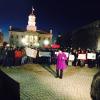Dear Ms. Stuart,
The current system of classroom management is inefficient and does not serve the best interest of University of Virginia students. Instead of locking classrooms in the evenings, select classrooms should stay open throughout the night. This would reduce the number of students crowding inside libraries, offer alternative places to study, cater to students who don’t like studying in libraries, and also help students study more effectively.
The 2030 Plan is a set of goals and initiatives to make UVA “the leading public university”. In the 2030 Plan, President Ryan writes, “If I am correct, colleges and universities in 2030 will be judged by the quality of their classroom and residential experiences and how these contribute to the future success of our students.” I agree that the academic environment in colleges and universities are instrumental to the success of the students within the institution as well as the institution itself. In addition, a section of the 2030 Plan states, “Our students, faculty, and staff need high-quality systems to support their work, including sufficient and efficient research infrastructure. We will have financial and technological tools and nimble, reliable systems, and help every member of the University community to be more efficient and effective.” In accordance with the goals of the 2030 Plan, classrooms should be converted to study spaces when they aren’t used for classes in order to provide students with a better academic experience. This would allow students to be “more efficient and effective” which, accordingly, shall contribute to President Ryan’s goal of making UVA “the leading public university”.
Throughout finals week, Clark Hall and Clemons Library are packed with students working on homework and studying for important tests. At peak hours, the library is beyond its capacity, and students struggle to find open seats to do their work. Last semester, I saw students studying on the ground, unable to find a spot to sit in the library. Undoubtedly, studying on the floor isn’t optimal for students, and I think it’s important for the university to provide alternative study spots in order to give students other options. Opening up unused classrooms as study spaces will help alleviate this problem. Both an empty classroom and a seat in the library serve as great study spots for students because both spots are quiet, on grounds, and have few distractions. Classrooms as an alternative study space will provide students with a better study spot and allow them to be more effective and efficient.
After speaking to a couple of students, I found there is a lot of interest in studying within classrooms. When asked if she had ever considered studying in a classroom instead of in Clemons Library, Elizabeth, a first-year chemical engineering major, said “I didn’t know that studying inside classrooms was an option. I definitely see how it would be nicer than a library, though. It’s much more peaceful and there’s probably a lot more space to move around.” There is a lot of interest in studying in classrooms, but many students aren’t aware this is a valid alternative. Jason, a first-year statistics major, had experience studying in classrooms, “I used to study in the classrooms under my dorm [Shannon House], but after winter break they started locking the doors after 9pm. I got a lot of work done down there. I study in my room now but it’s a lot easier to get distracted.” For students, classrooms are great place to study and opening classrooms late at night can help students find better alternatives to libraries.
As stated by the University Registrar, the Classroom Utilization Report has concluded, “the University has too many classrooms and that much of our classroom stock is the wrong size (e.g., too many 26-50 person classrooms and too few 1-25 person classrooms). The consultants recommended a reduction in available classroom space of 22,000 square feet.” The university seems to have an abundance of classrooms, and instead of withdrawing or retiring these classrooms, these classrooms should be repurposed as study spaces.
Opening classrooms late at night does cause some security issues. Students tend to be messy, and allowing students into classrooms means that the University will likely need a slight increase in staff in order to clean up after students and also make sure the buildings and classrooms are safe. However, opening up all the classrooms across campus is not necessary; instead, I suggest opening a few, select classrooms. Perhaps the ones that are going to be withdrawn. This way, only a few staff members are needed to maintain and secure these classrooms and it won’t take an exceptional amount of staff just to open up classrooms for a few more hours.
Given the University’s abundance of classrooms, it would be beneficial to both students and the university if select classrooms were converted to study spaces late at night. Opening classrooms late at night would allow students to be more effective and efficient, reduce the load on libraries, and contribute to the president’s goal of improving the University.
Open Letter to the Associate Provost of Classroom Management
Subject: Open Letter to the Associate Provost of Classroom Management
Date:
25
Apr
2022
Category:















